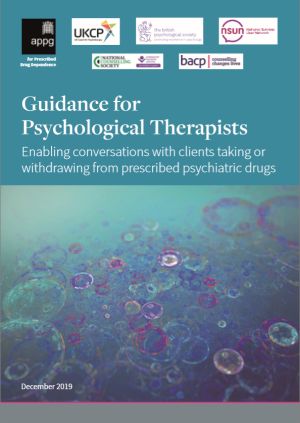The main professional bodies representing psychological therapies in the UK worked with key academics and professionals to create the guidance along with supporting training materials.
The guidance and resources have been funded by BACP, British Psychological Society (BPS) and United Kingdom Council for Psychotherapy (UKCP), and steered in conjunction with the secretariat for the APPG for Prescribed Drug Dependence, (since renamed the Beyond Pills APPG) - all members of the Council for Evidence-based Psychiatry (CEP).
They’re endorsed by the main non-modality specific professional bodies, including the National Counselling and Psychotherapy Society (NCPS), for use by their members and relevant training organisations.
Aims
The aims of the guidance are to:
- support therapists in deepening their knowledge and reflection on working with clients prescribed psychiatric drugs such as antidepressants and antipsychotics
- summarise the main effects, adverse consequences and possible withdrawal reactions for each main class of psychiatric drug
- invite therapists to familiarise themselves with core issues relating to the role of psychiatric drug use (and withdrawal) and the implications this has for clients in therapy
- be relevant to therapists from a wide variety of theoretical models
- provide information for therapists on key questions and concerns relevant to their therapeutic work with clients who are either taking or withdrawing from prescribed drugs in order to enable them to decide whether, and to what extent, they will use it in their work
- potentially reduce the impact of issues associated with taking or withdrawing from psychiatric drugs on clients
Key issues and implications
Drugs have been the mainstay of psychiatric treatments since the 1950s. It used to be assumed that the major types of drug used in psychiatry worked to reverse, or partially reverse, underlying disease processes (for example, chemical imbalances) - this is called the disease-centred model of action. This guidance presents the latest evidence which finds little support for this model.
Where psychiatric drugs produce helpful effects, they are best thought of as a temporary tool or coping mechanism that can be a precursor to psychological change. This is known as the drug-centred model of action.
The guidance aims to demystify legal and ethical concerns that therapists may have. For example, it establishes the difference between giving medical information and giving medical advice and is clear about the ethical considerations involved. It's also highly practical, considering how such issues may already be present in the counselling room and offering a range of responses for practitioners.
This is a deliberate attempt to broaden therapists' perceptions of what lies within their competence by providing relevant evidence, information and ideas for practice.
Course training materials
The Guidance authors, facilitated by the secretariat for the Beyond Pills APPG (2020 to 2024, previously APPG for PDD) have also developed training materials which were piloted in a small number of universities in the academic year 2023 to 2024. Following this successful pilot, they're now freely available to any training institution wishing to use them.
The resources have been developed as flexible modules so they can be combined in a number of ways depending on the course time available.
There’s a suggested menu card for different length sessions as well as a summary of course materials and suggested questions for consideration after the material has been watched.
View the training materials: Guidance for Psychological Therapists.

